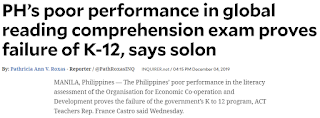A Child Is Born

Christians all over the world celebrate a great evening tonight. Our faith tells us that salvation has entered this world through an infant. Yet grace has come to us through a helpless and perhaps, snotty young child. It is a child no different from those we regard as a member of a low-income family that will probably qualify for a reduced-fee or even free lunch. It is a child who is likely to be an English-language learner. Will this child then have the grit to thrive in basic education? Or will this child be placed in a class of low expectations? Denied of privilege, this child may not even be prepared to enter kindergarten in a school where life begins as a race, a competition where getting ahead is key to academic success. How does a child of poverty cope with a world where life is a zero-sum game? How can a child surmount these challenges if the only way one child gains something is for another child to lose something? With this in mind, our faith shows likewise how important equi...











